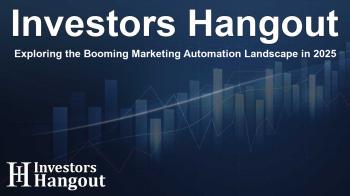Exploring the Booming Marketing Automation Landscape in 2025

The Marketing Automation Market on the Rise
Marketing automation is rapidly evolving, with projections indicating growth from USD 47.02 billion in 2025 to an astonishing USD 81.01 billion by 2030. This impressive surge is expected to occur at a compound annual growth rate (CAGR) of 11.5%, showcasing the increasing importance and adoption of these tools across various industries.
Understanding the Dynamics of Marketing Automation
Drivers of Growth
One of the primary catalysts for this growth is the transformation in customer engagement techniques, largely driven by AI-powered marketing automation solutions. These technologies allow businesses to tailor their marketing efforts precisely, ensuring they reach the right audience effectively, ultimately maximizing returns on investment.
The integration of omnichannel automation platforms has also played a pivotal role in enhancing customer experiences. By utilizing various channels, companies are now able to provide coherent and consistent interactions at every touchpoint, reinforcing customer satisfaction and loyalty.
Key Opportunities and Innovations
Generative AI represents another major opportunity within the marketing automation ecosystem. By accelerating hyper-personalization efforts, it enables marketers to produce customized content rapidly, while also streamlining complex workflows. This shift towards AI integration boosts predictive capabilities, ultimately improving decision-making processes.
Challenges in Marketing Automation
Addressing Market Restraints
However, not all aspects of this sector are free from challenges. A notable restraint is the gap in AI-marketing talent, which restricts the scalability of automation solutions across various enterprises. Finding skilled professionals who can navigate and manage these tools effectively continues to be a significant hurdle.
Leading Companies in the Marketing Automation Space
Several companies stand at the forefront of this market, influencing trends and adoption. Prominent players include HubSpot, Adobe, Oracle, Salesforce, Microsoft, SAP, Thryv, SAS Institute, Klaviyo, and Intuit. These organizations are shaping the future landscape of marketing automation through continuous innovation and advancements in AI technologies.
North America's Market Dominance
North America holds the largest share of the global marketing automation market, largely attributed to its advanced digital infrastructure and a high rate of technology adoption. This region is home to key vendors who drive innovation and product development, ensuring continued growth in the marketing automation domain.
The robust digital economy present in the United States, along with the significant presence of tech-savvy consumers, facilitates the rapid uptake of automated marketing solutions. Verticals such as e-commerce, BFSI, healthcare, and retail leverage these platforms extensively to enhance customer acquisition and retention strategies.
Future Trends in Marketing Automation
As we look ahead, the marketing automation landscape is poised for even more dynamic changes. The rise of generative AI, combined with the growing emphasis on real-time data and personalization, will likely redefine how companies approach their marketing strategies. The adoption of these advanced tools is not just for the large enterprises; rather, small and medium-sized enterprises are also rapidly integrating these solutions to remain competitive.
Strategies for Success
To thrive in this evolving environment, companies should focus on incorporating robust AI and machine learning capabilities into their marketing platforms. This can not only enhance predictive analytics and campaign execution but also broaden the accessibility of these tools to a wider range of businesses.
Moreover, establishing strategic partnerships and maintaining a commitment to continual innovation will further fortify a company’s position in the market. Offering user-friendly solutions tailored to SMEs can significantly expand their outreach and provide more businesses with the opportunity to leverage marketing automation effectively.
Frequently Asked Questions
What is marketing automation?
Marketing automation refers to technologies and software that help companies automate repetitive marketing tasks, enabling more effective engagement and campaign management.
Why is the marketing automation market growing so rapidly?
The rapid growth is fueled by the increasing need for personalized marketing, the integration of AI technologies, and the demand for improved customer engagement strategies.
Who are the leading companies in the marketing automation industry?
Prominent companies include HubSpot, Adobe, Oracle, Salesforce, and Microsoft, all driving innovation and development in the sector.
What challenges does the marketing automation field currently face?
Challenges include a shortage of talent skilled in AI marketing and the need for continuous innovation amidst rigorous competition.
How can businesses effectively implement marketing automation?
Businesses can implement marketing automation by focusing on user-friendly technology, integrating AI features, and fostering a deeper understanding among users through education and support.
About The Author
Contact Dominic Sanders privately here. Or send an email with ATTN: Dominic Sanders as the subject to contact@investorshangout.com.
About Investors Hangout
Investors Hangout is a leading online stock forum for financial discussion and learning, offering a wide range of free tools and resources. It draws in traders of all levels, who exchange market knowledge, investigate trading tactics, and keep an eye on industry developments in real time. Featuring financial articles, stock message boards, quotes, charts, company profiles, and live news updates. Through cooperative learning and a wealth of informational resources, it helps users from novices creating their first portfolios to experts honing their techniques. Join Investors Hangout today: https://investorshangout.com/
The content of this article is based on factual, publicly available information and does not represent legal, financial, or investment advice. Investors Hangout does not offer financial advice, and the author is not a licensed financial advisor. Consult a qualified advisor before making any financial or investment decisions based on this article. This article should not be considered advice to purchase, sell, or hold any securities or other investments. If any of the material provided here is inaccurate, please contact us for corrections.

